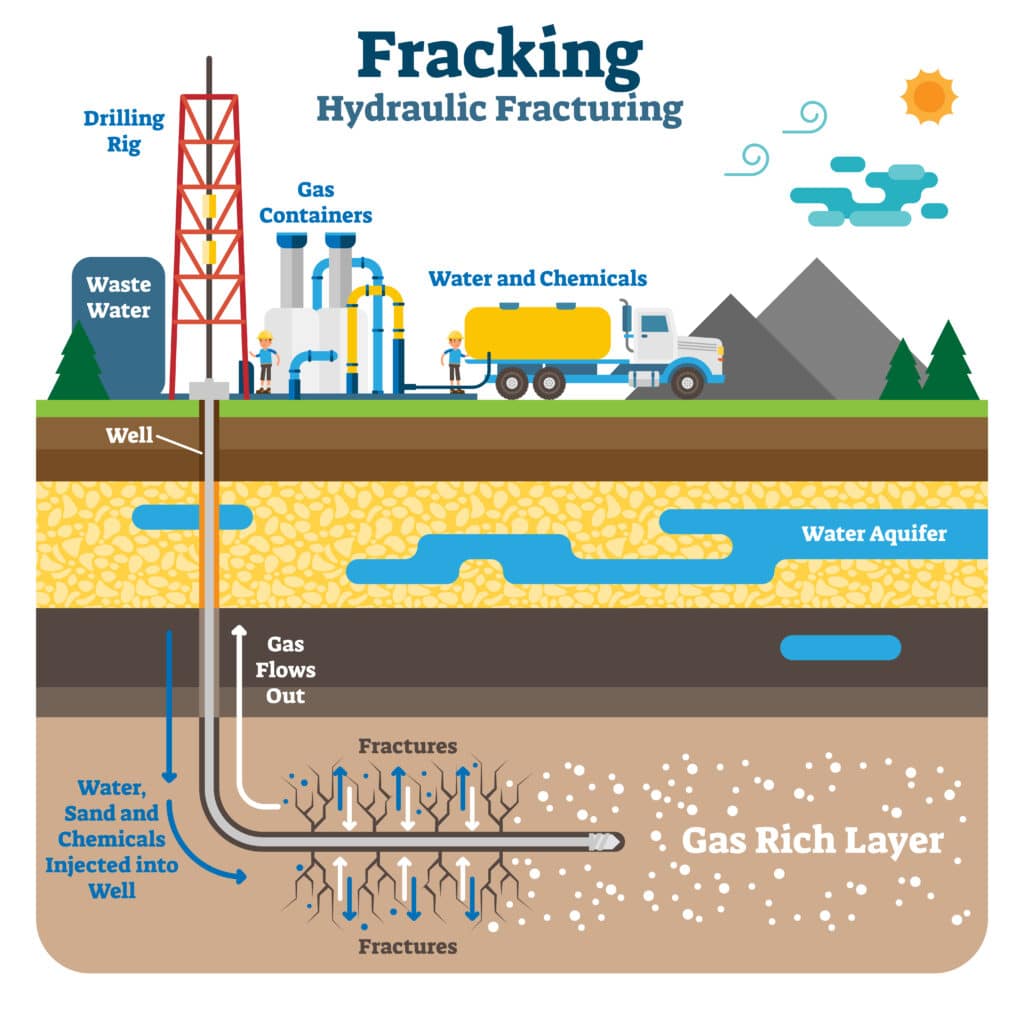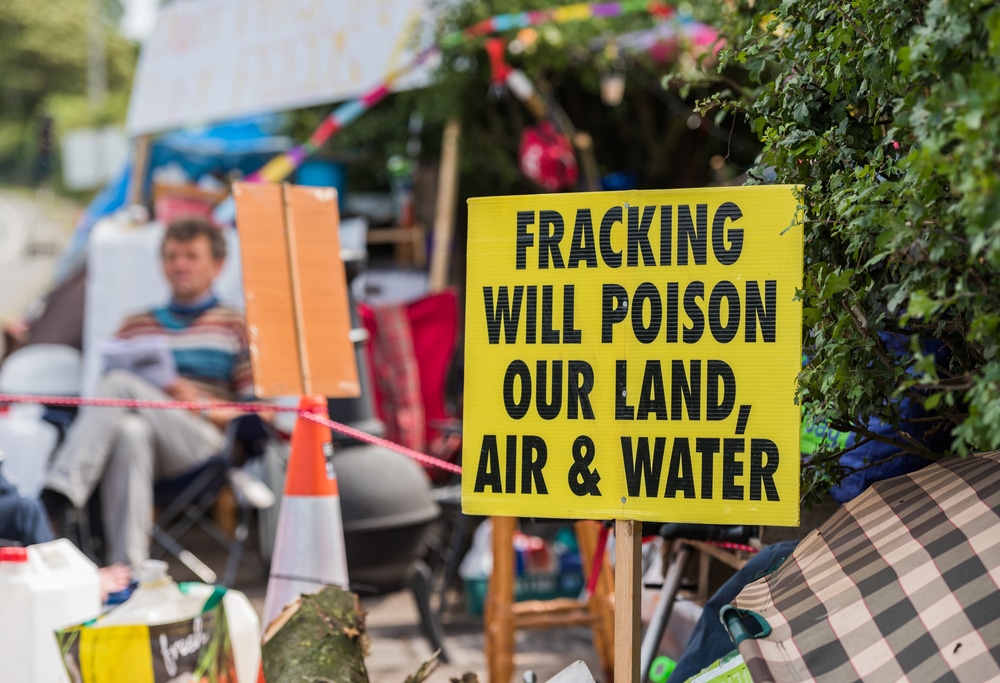What is Fracking?
Fracking refers to the extraction of oil and natural gas using hydraulic drilling. Many people consider fracking bad or controversial because of its potential to pollute the water and the natural habitats of many animals.
While some argue the process exacerbates climate change, proponents claim it is a crucial scientific innovation.
Why Is It Bad?
While fracking is an efficient process that allows us to extract oil quickly, it can be damaging. The chemicals in the stimulation fluid can be harmful to both humans and wildlife.
The fracking process begins by drilling either vertically into the ground or horizontally into a shale formation. Next, casing pipes are put in to protect the water.
After this, a well is ready to be lowered into the wellbore. Lastly, a perforation gun fires into the well and creates small holes in the casing.
Once the perforation of the rock is complete, a stimulation fluid is injected into the holes at high pressure. The high pressure allows fossil fuels to travel up to the wellbore. The fluid consists mainly of water and sand but also includes chemical additives.

These toxic substances may also pollute the air and water. Ingredients include:
- Hydrochloric acid
- Benzene
- Methanol
- Other petroleum distillates

There is evidence that many of the ingredients in the chemical fracking cocktail are carcinogenic and cause many health issues. Their potential to leak into drinking water is thus a valid concern.
Another concern is that the process can potentially release methane into the atmosphere.
Additional problems related to fracking include the increased possibility of earthquakes, potential reduction in water availability, and overall contribution to poor air quality.
Why Is Fracking a Good Thing?
Fracking has been one of the most revered technological advancements in the last half-century. One of the main arguments in favor of fracking is the cost reduction of natural gas.
People use natural gas to heat their water and light up their gas stoves. Thanks to fracking, the country enjoys ample inexpensive gas.
Electricity is vital to everyday life. Because we can use gas for electricity, fracking is also essential to the success of many industries.
In particular, large electrical worker groups and unions such as IBEW (International Brotherhood of Electrical Workers) have continuously supported fracking efforts.
The fact is that many workers depend on fracking for their jobs. Thus, the process of fracking creates wealth, encourages employment, and overall helps the economy.
The IHS predicts that by the year 2025, fracking will have created more than 3.9 million jobs. It also suggests that banning fracking would result in higher gas prices.
A report showed that fracking communities also made more significant economic gains. Energy consumers combined have enjoyed an increase of $74 billion per year.
Lastly, because natural gas is cleaner than burning coal, the process diminishes carbon pollution. According to the International Energy Agency, using gas instead of coal has led to a global savings of 550 million tons in carbon emissions.
What Are The Pros and Cons of Fracking?
There is no end in sight to the controversy surrounding fracking. The division stems largely from the fact there are several pros and cons to the process.
Pros
Here are the top reasons people support fracking:
- Facilitated fossil resource access
- Fossil fuel deposits will increase
- Economic strength and stability
- A reduction in gas and oil prices
- Fracking may do less harm than coal
- The process occurs primarily underground
- Several job opportunities rely on fracking
Cons
On the other hand, fracking critics point out issues with environmental impacts and sustainability. In addition, many believe the economic benefits from fracking are minimal to communities.
Reasons to oppose fracking include:
- Methane emissions
- Creating a potential ecological imbalance
- Puts workers at risk of developing health issues
- Lack of long-term sustainability
- High water consumption
- Earthquakes likely to increase
- Noise and soil pollution
- Local communities may not benefit much
Is Fracking Worse Than Drilling?
Hydraulic fracturing is not the only way to extract oil. Conventional drilling is another popular way to extract oil and gas, and it too comes with consequences.
A reduction in air quality can result from conventional drilling just as it can from fracking. The former is noisy, causes forest fragmentation, and may disrupt natural wildlife habitats.
While it’s true that fracking requires a higher water usage, a Stanford study found that it uses less water to generate electricity than nuclear fuel or coal. In fact, the researchers state that coal power utilizes twice as much water per megawatt-hour.
The study found that fracking presents some benefits to the environment over conventional extraction methods. These include lowering carbon dioxide emissions more than coal.
Moreover, no mercury, ash, or sulfur dioxide are present in fracking compared to coal.
That said, the same study points out that although fracking shows promise in terms of lowering air pollution, the benefits may not outweigh the risks. After all, it is essentially a trade for methane emissions.

Ultimately, both fracking and drilling can cause environmental harm. Both processes result in high water consumption in different ways as well.
Fracking involves the use of more toxic chemicals, however, which may pose a higher risk to workers and communities.
Luckily, the ill effects of both processes can be mitigated. By adopting safer practices and more pragmatic policies, fracking may present the lesser of two evils.
A Texas study concluded that there are widely varying rates of fracking-induced contamination. Researchers suggest this has to do with careless drilling methods.
When it comes to methane emissions, sloppy fracking practices are to blame too. It seems that by carefully monitoring fracking practices and mechanical processes, we can control its detrimental effects.
Fracking is growing in popularity as a renewable energy source. Though the fracking controversy won’t resolve any time soon, solutions to mitigate its negative impacts exist.
It will be up to the fracking industry to improve its oversight and operations. What’s for sure is that fracking is rapidly replacing nuclear power and shows a promising future.